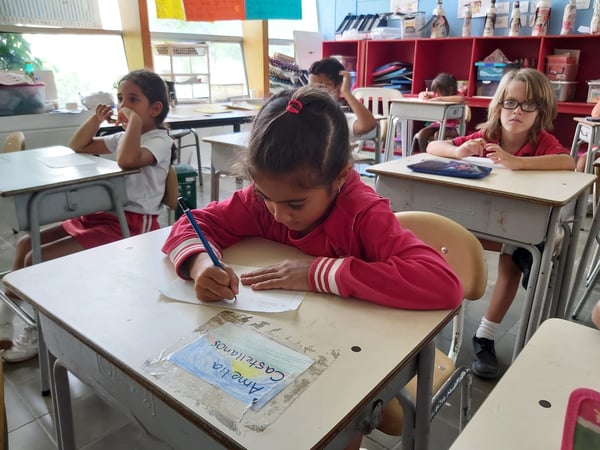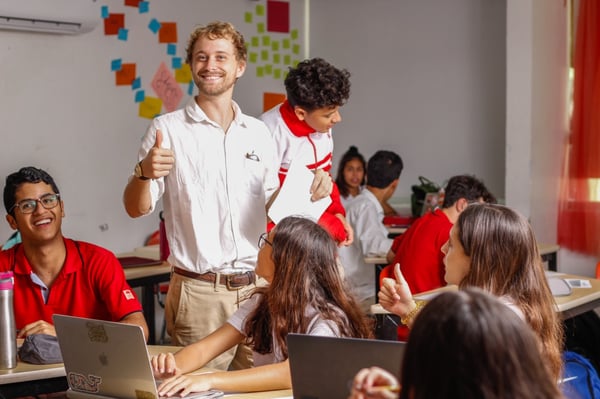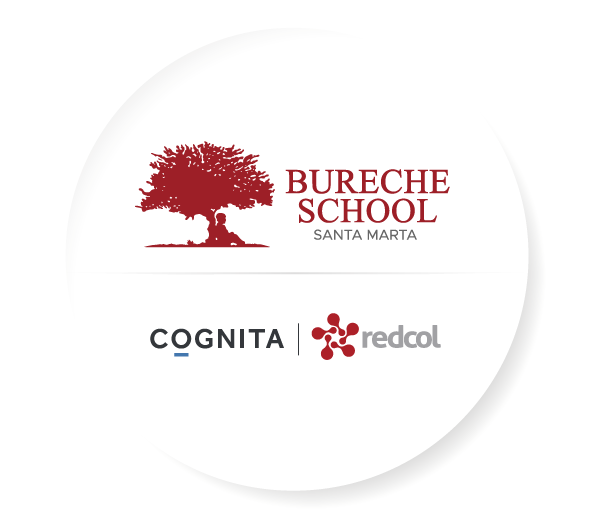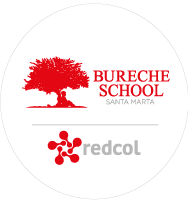Bilingual is a word that most people simply define as the ability to speak two languages. Based on that simple definition, a bilingual school is a school that offers instruction in two or more languages. What these two definitions do not take into account is the level of instruction or commitment to the practice of the foreign language or languages that are present in an institution.
We often meet parents in the admissions process who claim that their children come from bilingual schools, but when we evaluate them, we find that these students are bilingual in the sense that they can understand or speak limited English, while the average student at Bureche performs at a much higher level. This begs the question: what is different about the Bureche program compared to other bilingual schools?
In the world of education, a more frequently used term that helps define a school's commitment to being bilingual is the word bilingualism. Merriam Webster defines bilingualism as "the frequent use (by a community) of two languages." Frequent use is the key conclusion of this definition and can help clarify what Bureche is doing differently from other programs.

At Bureche we pride ourselves not only on being a bilingual school, but on improving our commitment to bilingualism every day, through a variety of programs and strategies. Some of the most obvious examples at Bureche can be found in the type of teachers and administrators we employ, the exams our students take, the cultural diversity we promote, and even the exchange programs we offer.
In each area we strive to cultivate the idea of bilingualism as an integral part of who we are and what we do as a school. At Bureche we are committed to hiring teachers who are native English speakers to teach a variety of subjects, especially in the preschool and elementary formative years, where research shows that students are much more proficient at learning a second language.
Our native teachers speak little or no Spanish, creating these wonderful situations where students must learn to communicate clearly in their second language. Imagine the first graders trying to explain a conflict that happened in the park to their teacher after recess and doing it all in English! While that explanation can be a big challenge for a six-year-old with a limited English vocabulary, the opportunity to do so provides a space for practicing problem solving and creative thinking, two areas in which bilingual children regularly outperform monolingual children.

Our foreign teachers often come from different parts of the world, including the United States, Canada, England, and even South Africa, and the cultural exposure this provides for our students is another key aspect of bilingualism. Each teacher will leave their mark on our students, teaching them not only how to speak a second language, but also by sharing many lessons on diversity and culture. It is also important to note that we employ many teachers and administrators who are not native English speakers, but who are truly bilingual and contribute immeasurably to the level of bilingualism we enjoy here at school.
Another aspect that helps to define the difference between Bureche and other bilingual schools is that we offer exams such as the MAP tests in the third to tenth grades and the PSAT / SAT in the tenth to twelfth grades. These standardized tests are offered in English and allow us to assess the academic progress of our students throughout the curriculum. Not only do we teach English as a second language, what we offer is a comprehensive bilingual education program and our test results show that our students are not only bilingual, but can compete academically in both languages.
A final aspect of bilingualism that we are currently paying more attention to is the practice of providing exchange programs to a broader range of students. We currently offer programs that take place in Canada, New York, Florida, Georgia, and England and these programs are now available to students from elementary to high school. Each program has a different focus and they are all available to students as a way to hone their second language skills, while having a different cultural experience than anything they have encountered before. Students who participate in these exchanges have a unique opportunity to further enrich and promote the use of a second language here at school and in their personal lives as well.
Over the past year, the word “bilingualism” has become a much more explicit and intentional approach to school, whereas in the past it was something that seemed to occur almost naturally. By continually reflecting on what drives the level of bilingualism here at Bureche, we can make changes to our programs, with the goal of developing truly bilingual students in mind.
♠ Author: Patrick Bauch - High School Principal
References Bialystok, E. (2011). Reshaping the mind: The benefits of bilingualism. Canadian Journal of Experimental Psychology/Revue canadienne de psychologie expérimentale, 65(4), 229–235. https://doi.org/10.1037/a0025406






